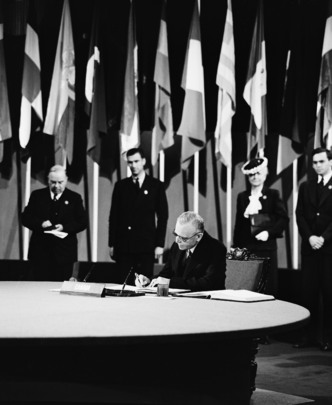Connecting With International Human Rights Day
Today is International Human Rights Day, a celebration of the establishment of the Universal Declaration of Human Rights in 1948. The document was the natural progression of the newly formed United Nations in 1945, which was created in response to the atrocities of World War II. Below is a photograph of then Minister of Justice and Attorney General of Canada, Louis St. Laurent, signing the UN Charter in San Francisco:

This act in 1945, appeared to solidify Canada's presence at the UN as a peacekeeping nation and stolid protector of human rights.
In actuality, although John Peters Humphrey, a Canadian law professor, was the original drafter of the Declaration, Canada was not initially supportive of its implementation. William Schabas, presently a professor of international law and Director of the Irish Centre for Human Rights, in his excellent journal article entitled Canada and the Adoption of the Universal Declaration of Human Rights, explains Canada's initial refusal to support the Declaration when Lester Pearson, the then External Affairs Minister to the UN, abstained in an earlier vote. It was only after pressure from Canada's allies, the UK and the USA, that Canada's final vote was changed in favour of implementation.
Schabas, through a detailed review of archival documents uncovered the real reason for this reluctance, bordering on "hostility," shown by the Canadian delegation. Pearson and others in the Canadian Government were concerned with the entrenchment of the broad human rights, which would become available under the Declaration, and could be used by "suspect" groups in Canada. In particular, the government feared the rights of freedom of religion and freedom of association would protect the Communists and Jehovah Witnesses, two groups identified by the government as "subversive" groups. Indeed at the time, the infamous Padlock Laws, enacted by then Quebec Premier Duplessis, which empowered authorities to "padlock" any building which held any "communist" literature or permitted the gathering of anyone associated with communism, was still in force.
It is, therefore, important to recall this dark side to Canada's history when rejoicing in our global commitment to freedom and choice through protections of human rights. Our successes in the area seem to be that much more impressive when we embrace the missteps of the past and move toward a more inclusive tomorrow.
This cannot be more so when we recall Canada's recent contribution to international human rights through Louise Arbour, an exceptional legal jurist who served as the High Commissioner for Human Rights and as Chief Prosecutor for the International Criminal Tribunals for the former Yugoslavia and Rwanda. Admittedly, her tenure did not go without controversy, however, she is a prime example of the dedication Canadians have shown to our international covenants.
More importantly, what makes today a cause for Canadian celebration and pride, is our commitment to human rights nationally. Our Charter of Rights and Freedoms has changed the fabric of Canadian society and has given life and meaning to fundamental freedoms and protections. It is this duality of commitment, which is epitomized by Louise Arbour as a former Supreme Court of Canada Justice, who wrote strongly in favour of the protection of rights, and, as the author of the Arbour Report, uncovered abuses at the Prison for Women at Kingston Penitentiary.
This truly is the legacy of the Declaration.
 Lisa A. Silver
Lisa A. Silver